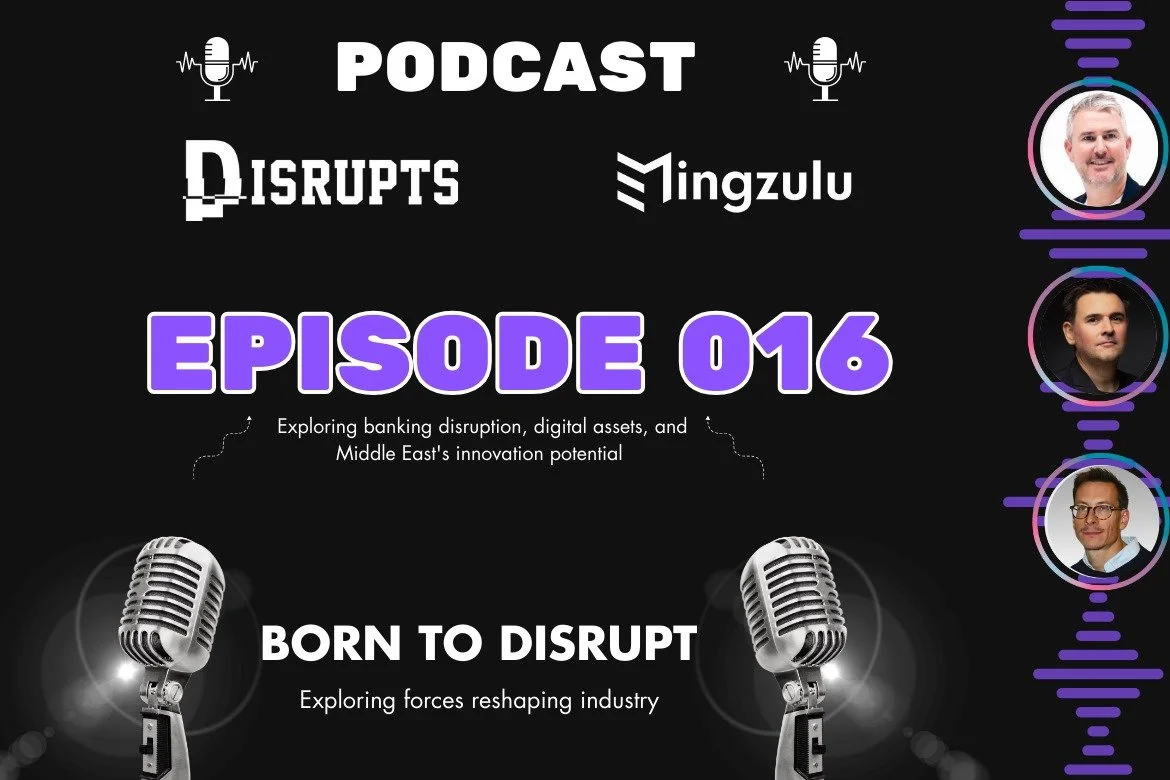Born to Disrupt – Mark Dymock’s Journey Through Banking, Ventures and Digital Assets
In this episode of "Born to Disrupt," hosts Grant Niven and Simon Hardy welcome Mark Dymock from Standard Chartered Ventures. The discussion centers around the theme of disruption in the banking industry, highlighting Mark's journey from traditional finance roles to his current position in venture building. The conversation explores the strategic shift of Standard Chartered Ventures to the Middle East, emphasizing the region's potential as a hub for innovation and growth. Key topics include the role of digital assets, the importance of aligning with regional visions like Saudi Arabia's Vision 2030, and the challenges and opportunities in navigating regulatory environments. The episode concludes with insights into the evolving landscape of fintech and the ongoing journey of innovation in the financial sector.
In episode 16 of *Born to Disrupt*, hosts Grant Niven and Simon Hardie welcome Mark Dymock, Operating Partner at Standard Chartered Ventures, for a candid discussion on personal transformation, corporate venture building, and the changing innovation landscape across the Middle East and Africa.
Mark Dymock's journey is a study in disruption. Originally trained in traditional finance, his early career saw him working in M\&A roles at GE Capital and later Standard Chartered. But a pivotal moment came when he decided to move beyond the confines of traditional banking to understand how financial services truly operate across people, process, and technology. That leap eventually took him into the world of innovation and ventures. As he explains, joining Standard Chartered Ventures was a personal act of disruption – a deliberate pivot from corporate conformity to entrepreneurial experimentation.
Now based in Dubai, Mark sees striking parallels between Singapore in 2009 and the UAE today. Both represent fast-growing innovation hubs fuelled by strong government vision, energetic entrepreneurial communities, and an appetite for disruption. The decision to base SC Ventures in the UAE reflects both a strategic bet on regional growth and a commitment to building long-term relationships and impact from within, rather than flying in and out.
Mark outlines the unique model that distinguishes Standard Chartered Ventures from most corporate venture capital units. While many banks limit innovation to tech pilots or minority investments, SC Ventures takes a full-stack approach. The team not only invests in startups but also builds new ventures from scratch, often led by former bank employees who spotted a gap and wanted to fix it. These founders are incentivised with equity and backed with early-stage capital, infrastructure, and commercial expectations. It’s a model that blends the scale of a global bank with the hustle of a startup studio.
A major focus for SC Ventures is digital assets, where Standard Chartered has been an early mover. With ventures in custody, tokenisation, and stablecoin payments, Mark sees blockchain technology as critical to the future of wholesale finance. But the team’s remit goes far beyond crypto. They are exploring opportunities in SME finance across the GCC, fintech infrastructure in Africa, and the rise of Dubai as a global wealth hub.
Mark also speaks passionately about fintech's potential for real impact. He highlights a venture in Uganda offering loans to help parents pay school fees – a service that has financed 36,000 students in just nine months and remains profitable. These are the kinds of practical, scalable, and socially meaningful disruptions that he believes will define the next chapter of financial innovation.
Throughout the conversation, Mark, Grant, and Simon reflect on the importance of regulatory engagement and long-term commitment to the Middle East. For founders and funds hoping to raise capital from the region, Mark is clear: you need to show up, incorporate locally, and align with regional visions like Saudi Arabia’s Vision 2030. Capital will follow conviction, but fly-in-fly-out models no longer cut it.
As the episode closes, the trio return to the idea that banking, despite all the change, is still on day two of its disruption journey. The podcast’s title, *Born to Disrupt*, remains as relevant as ever. And with leaders like Mark Dymock helping to rewire institutions from within, the future of financial services looks far from finished.
This episode is a must-listen for anyone interested in how legacy institutions can evolve, how innovation ecosystems scale, and why the Middle East is becoming a global testbed for what comes next in finance.

